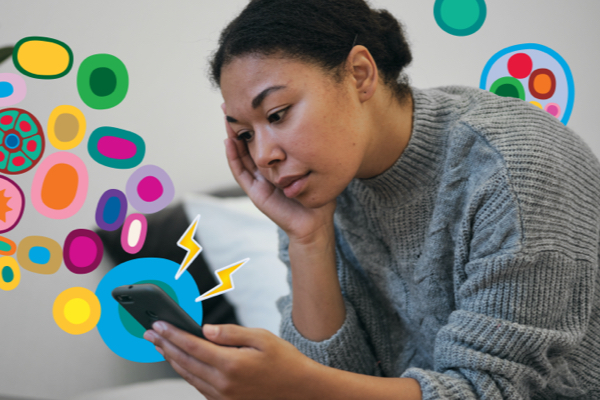How to talk about mental health with your partner

Jump to section: | How to prepare | Having the conversation | What if it has a negative reaction? | Where to get help |
Open and honest communication is an important part of every relationship. When you’re with a new partner you want to share experiences, interests and concerns. Every relationship is different, but the healthiest relationships have these three things in common:
good communication
being respectful and supportive
feeling safe and secure.
You may get to a point in a new relationship where you feel comfortable to share information about your mental health. Remember, it’s a personal choice to share this information and you should never feel pressured to share if you are not ready or it makes you feel uncomfortable.
How to prepare
Make sure your partner is someone you trust and who you think will listen and understand. Every relationship is unique but only you can decide how and when to talk to your partner about your mental health.
Write down your thoughts and plan what you want to say. Put your thoughts in order so you can communicate details about your mental health clearly. You may want to write a letter or story to make it easier to express yourself. Pick a method that works best for you.
Choose the right time to have a conversation about mental health. Select a time and place where neither of you will be interrupted or distracted, and make sure you’ve got all the time you need. You may find it easier to talk when you go for a walk, do an activity together or go for a drive.
Only share as much as you want. You’re in control and you get to decide how much you feel comfortable sharing. You don’t have to answer your partner’s questions immediately and look for opportunities to keep the conversation going.
Talk on the phone. If you don’t feel comfortable discussing your mental health in person, that’s okay, a phone call is an effective alternative.
How to have the conversation
Whether it’s a new relationship or a long-term relationship, it may be a relief to talk to your partner about your mental health. If you’re not sure how they’ll react, you can practise what you want to say beforehand with a trusted friend or family member.
Initially, your partner may not realise you have mental health challenges. If they have an idea, they may not be sure how to discuss the topic or they may be nervous. They may guess or blame themselves, which can lead to confusion. If you start the conversation, it may be a good first step for you and for them.
If you work with a mental health professional, you could ask them to talk to your partner and answer any of their questions. It may also help to share with your partner any suitable websites or reading material that may help to describe your experience.
What if there’s a negative reaction?
Everyone has different views on mental health based on their own knowledge and understanding. Despite the fact there’s a lot of mental health education and advocacy, some people may still have negative views. Some people may change their views and become more accepting with education and time.
If your partner has a negative reaction to a discussion about mental health, it’s important to remember that your mental health challenges don’t define who you are.
Remember that 1 in 5 people in Australia aged 16 – 85 experience a mental disorder each year. It doesn’t mean you’re weak and we all need support at different times in our lives.
Connect with others, which could be via a support group or take part in a forum or chat. These connections can help you realise you are not alone, and that others are going through a similar experience.
Learn more about your mental health and wellbeing. Read online or talk to health professionals. Being informed helps you to understand more about what you’re experiencing.
Focus on what you can control. People’s negative attitudes are due to a lack of knowledge. You can point your partner towards information and resources if you like, but don’t feel like it is your job to educate them.
Most importantly, don’t let someone else’s views on mental health impact your self-confidence and how you access support services.
Where to get help
If your life or someone else’s is in danger, call 000 immediately.
If you’re in distress and need help, call Lifeline on 13 11 14 for 24/7 crisis support.
For non-emergency support, your GP or regular health practitioner is often the best place to start. They will be able to assess your individual situation and recommend the best next steps for your recovery.
Remember that help is always available, no matter the situation.
How can we help?
I want to know how my cover supports mental health
I need help and want to talk
Related articles
Things you need to know
While we hope you find this information helpful, please note that it is general in nature. It is not health advice, and is not tailored to meet your individual health needs. You should always consult a trusted health professional before making decisions about your health care. While we have prepared the information carefully, we can’t guarantee that it is accurate, complete or up-to-date. And while we may mention goods or services provided by others, we aren’t specifically endorsing them and can’t accept responsibility for them. For these reasons we are unable to accept responsibility for any loss that may be sustained from acting on this information (subject to applicable consumer guarantees).


